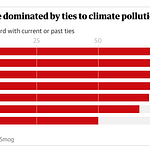Early this morning, I came across an article in Axios that I did not like. The headline: “Clean energy and climate change unlikely to lead American recovery.”
Written by columnist Amy Harder, the article argues that significant climate and clean energy policy won’t make it into Congress’s next coronavirus economic relief package.
“Reality check,” she writes: “Such prospects face uphill battles almost everywhere, and especially in the United States, where proponents [of solving climate change] are on defense while the Trump administration and lawmakers are in crisis mode.”
I do not dislike this article because it is wrong. I dislike it because Harder is right. We are not on the path toward passing an economic recovery package that will address the next global health and economic crisis while addressing the current one.
Our political leaders are about to spend trillions of public dollars on simply getting “back to normal,” when we know that “normal” is what got us into this mess. We know “normal” guarantees an imminent climate crisis, one that will cause just as much if not more health and economic devastation as COVID-19.
We know “normal” is a death trap. So why are we trying so hard to go back?
We’re not talking enough about the climate/COVID connection
The necessity of addressing coronavirus and climate change together was not always clear. Back in March, when the virus had just started taking over America, climate activists actually encouraged people not to talk about the two issues in tandem, fearing they would be seen as opportunistic or insensitive.
That didn’t seem right. After all, the climate crisis makes viral pandemics more likely to occur. Both crises threaten millions of lives and economies around the world. And climate change wasn’t taking a break for the virus; both were getting worse at the same time. So if anything, the pandemic made climate change seem more relevant, not less.
That’s why, back in March, this newsletter took the opposite tack: we launched a rapid-response podcast to emphasize the connections between climate change and coronavirus.
Over the course of 18 days, my podcast team and I produced and released six interviews with experts who could shed light on different aspects of the COVID/climate connection. Those interviews all served distinct purposes:
Bill McKibben of 350.org provided the overall climate activist perspective;
Kate Aronoff of the New Republic gave expert analysis of national policy and politics;
Anthony Rogers-Wright of the Climate Justice Alliance provided an overview of the effects on vulnerable communities;
Dr. Aaron Bernstein of Harvard C-CHANGE gave a rundown of the medical and scientific connections;
Mary Heglar of Columbia University dove into the emotional complexities of both crises and gave an ever deeper justice perspective;
and Ali Velshi of MSNBC spoke of the challenges of covering both crises as a mainstream journalist.
The series garnered a lot of attention. It got us a feature story in the print edition of The Guardian. It got us on MSNBC, and on the Earth Day episode of public radio’s 1A, featuring EPA administrator Andrew Wheeler and former EPA administrator Gina McCarthy.
Since launching, the podcast has been featured in Columbia Journalism Review; on Science Friday; on StateImpact Pennsylvania and New Hampshire Public Radio; and on PRI's The World and Living on Earth, among others.
Our podcast was also featured on Spotify’s official Climate Crisis playlist (updated once a month), and people on Instagram made cool memes about it.
But this clearly has not been enough. People still don’t seem to understand how inseparable these two issues are.
So today, we’re releasing a 7th episode of the HEATED podcast, in an attempt to provide an overview of what we learned in episodes 1 through 6 — and in an effort to fundraise so we can make more episodes as both crises continue to unfold.
Episode 7 is at the top of this email as an audio file. We also have our own feeds now on Apple and Stitcher; you can listen to it there, too, or click the button below.
What we learned: It’s now or never
In case you don’t feel like listening to the episode now, I’ll excerpt the two parts I think are the most relevant.
The first part is where we talk about the biggest overall lesson we learned from doing this podcast: that it’s never been more important to talk about climate change. Because while we sit and don’t talk about climate change—while we accept going “back to normal” as a solution—the fossil fuel industry and Republicans are not trying to go back to normal.
In fact, they are pushing through policies to worsen the climate crisis.
The same people who have historically told us that we cannot do anything about climate change—those are the people telling us right now that “now is not the time.” And these are the same people who are themselves being opportunistic with coronavirus by not talking about climate change.
They’re trapping us in the same cycle of doing what we've been doing. To go back to the way things were. But the way things were is a death trap. And the way things were is a huge profit machine for Republican lawmakers, for the fossil fuel industry, for everyone who profits off of the pandemic, and everyone who profits off of climate change.
The whole concept that we shouldn't talk about climate change right now is a smash and grab for the fossil fuel industry, for the plastics industry and for everybody in power who benefits from their profits.
Think of how many lives we could have saved, and think of how many millions, billions of dollars we could have saved if we started listening to climate scientists three decades ago. We literally can't afford to keep going down this path.
Coronavirus is showing us that now more than ever is the time to talk about the connection between these two things. Because if we don't talk about it now, we're never gonna talk about it. We're just going to let climate change do the exact same thing coronavirus is doing to us right now, which is kill us and destroy our economy.
What we learned: the community is powerful
The second part of Episode 7 I think is most relevant is where we talk about the power of this community to shift the national conversation around climate change.
Hand to heart, it’s unlike anything I’ve ever experienced in my journalism career.
I finally I feel like I'm serving a community. The only time in my professional life when I ever felt close to that was when I was 20 years old, and I was reporting on state government in New York.
I was covering these issues like pesticide bills that were important to mom’s groups, and domestic violence protection bills that were important to domestic workers and single parents. And it meant so much to the people who were advocating for those bills, just to see the issue in the paper, and just to get the recognition from those people that it was meaningful to them.
Then I came to Washington, D.C. to do national journalism, and I felt like that purpose of fulfilling a community need almost disappeared. And it wasn't until I started the newsletter, and then this podcast, that I started to feel it again for the first time. But it wasn’t about a local issue. It was about a global issue.That's what I think is so special about this community. We've created a close knit, almost local-like community around a global issue. I don't know anywhere else where that exists. I’m not trying to pat my own back here, because it's not me, it’s everyone else. But I really find that that's the most valuable thing about this community.
And the story of climate change and coronavirus isn't over. There are more chapters being written every single day, as the Trump administration writes bailouts for the fossil fuel industry; as Congress seeks to put sneaky language in economic recovery bills to prop up coal companies that have supported the Trump administration financially. And we can't cover those things without the community support.
So I'm so excited that we found this niche, and this community, and that potentially we have the opportunity to keep exposing this smash and grab, to keep telling the story that they don't want us to tell.
They're going to keep telling us to shut up about climate change and coronavirus. They're going to keep telling us that we're being opportunistic. They're going to keep saying that it's irrelevant.
That is because they're scared of what will happen if we don't shut up.
The podcast is a separate venture from the newsletter, and is 100 percent listener funded. We’d like to continue it—albeit on a much slower, more sustainable pace than the first six episodes—but we can’t do it without you.
If you’d like us to keep not shutting up about the connections between COVID-19 and climate change, you can help support the podcast by clicking the button below.
No matter what, though, the podcast team and I are so proud of the impact you’ve helped us make with this project. (IMO, it is probably because you have been staying so healthy and hydrated during this quarantine. Proud of you!)
And I’ll always continue yelling here, podcast or no podcast, because that’s the dream.
See you later!

OK, that’s all for today—thanks for reading/listening to HEATED!
If you liked today’s issue/episode, please feel free to forward it to a friend. If you are a paid subscriber and would like to post a comment, click the “view comments” button below:
If you’ve been forwarded this email, and you’d like to support the spread of independent climate journalism that focuses on the powerful, become a subscriber today:











